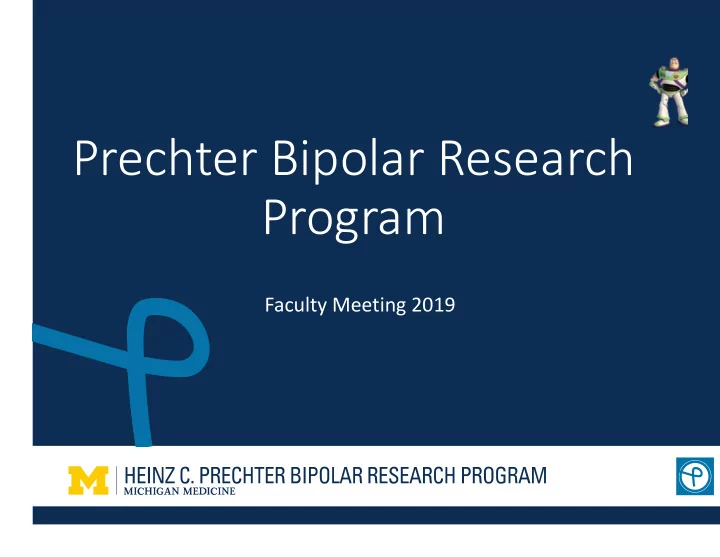

Prechter Bipolar Research Program Faculty Meeting 2019
Prechter Faculty Meeting: Agenda • Introductions • Overview of Prechter Program • Overview and vision of Precision Health • Three base questions – engagement /personal reviews / priorities • New ideas discussions • Governance • Advisory board • ‘superuser’ / super participant projects
Prechter Program: History • Story of Heinz Prechter • Creative entrepreneur • Suicide 2001 • Family Established Fund • Moved to UM in 2005 • 2017: commitment of 5M in endowed funds • Matching funds • Continued engagement in fund raising
Mission and Vision Statements • Our Mission: • The mission of the Heinz C. Prechter Bipolar Research Program is to discover the mechanisms that contribute to bipolar disorder, predict and improve outcomes, and develop effective, innovative treatments. • Our Vision: • We are building a future where personalized and evidence ‐ based treatments for bipolar disorder will enable every individual with the illness to lead a healthy and productive life.
UM: Prechter Project origins • Began project in 2005 (IRB) approval date. • HUM0000606 • Logic: large scale genetic projects were emerging. The Odds Ratios for each locus: modest (1.15) • No projects focused on level of detail at phenotype level • The Prechter program would be complementary to large programs
Academic Landscape Bipolar Disorder Genetics ‐ 2005 • No genes associated with Bipolar Disorder • Appreciation that many genes were involved • Large collaboratives GWAS • Wide studies: many participants, limited data • Few longitudinal studies in Bipolar disorder • Compare: Framingham Heart Study (began 1948) • Deep studies: fewer participants, extensive data
Prechter Bipolar Research Program Precision Health Clinic Clinic University University Community Community Eligibility Screening Eligibility Screening Ineligible Ineligible Eligible Eligible Heinz C Prechter 1942 – 2001 Initial Visit Initial Visit Neuropsychological Neuropsychological DIGS Interview DIGS Interview Testing Testing Blood for Genetics & Biomarkers Blood for Genetics & Biomarkers Questionnaires Questionnaires • Mechanisms Follow-up Follow-up – Predictive Modeling Questionnaires every 2 months Questionnaires every 2 months Year 1 : Neuropsychological Testing Year 1 : Neuropsychological Testing • Longitudinal – Active engagement Year 2 : LIFE Interview Year 2 : LIFE Interview Year 3 : Phone check in Year 3 : Phone check in • > 1300 Participants – 75% retention Entering Year 14
Longitudinal Study of Bipolar Disorder Identify mechanisms & predictive outcomes patterns in bipolar disorder January 2019 Total Enrolled:1304 Current Participants: 926 (71%) Central Biorepository: 613 Prechter Bipolar Genetics Repository: 2,088 Data Sharing Agreements: 18 Peer Reviewed publications: 92 Longitudinal Enrollment Status October 2018 1400 1200 1000 800 600 400 200 0
Ontology: Disciplines & Pluralistic Relationship to Phenotype Class Disciplines (10) Phenotype Classes (7) – Disease – Neurocognitive – Temperament / Personality – Motivated Behavior – Life Story – Sleep / Circadian – Outcomes Human Volunteer Participants
Prechter Phenotype classes • Disease : • Motivated Behavior • DIGS & LIFE • Fagerstrom • Audit ‐ R • Alcohol and • Temperament / Personality substance use • NEO PI ‐ R • BIS ‐ 11 (Barret Impulsivity) • Sleep & Circadian • Buss ‐ Durkee Hostility • PSQI (Pitt Sleep..) • Brown Goodwin Aggression • MCTQ (Munich ..) • SPAQ (seasonal pattern assessment
Prechter Phenotype classes • Life Story/Experiences • Neurocognitive Function • WAIS • LEOS (Life Events occur.. • LEC (Life Events Checklist.. • CVLT • FACES II (Family Adapt.. • Rey ‐ Osterrieth • Facial Emotion Perception • CTQ (Childhood Trauma.. • LFQ (Life Functioning • Emotion Processing Test • Purdue Pegboard • ECR (Experiences Close .. • Working Alliance Inventory • Parametric Go/No Go • Stroop Color Word • Trail Making • Clinical outcomes • Wisconsin Card Sort • PHQ9, ASRM, GAD7, SF12 • Synonym Knowledge • YMRS, HAMD • Test of Memory Malingering • C ‐ SSRS
Bipolar Disorder: Course Pathology of Energy Mania Depression Dynamic Energy State Time Mania Depression anticipate change? 1 year
Data types • Biological Mechanisms • Course and outcomes • Cell Developmental Biology • Illness patterns • Genetics • Psychology • Pharmacology • Neuropsychology • Animal models • Acoustic patterns • Cellular models • Life Story • Behaviors • Circadian • Missing Imaging • S. Taylor
UM experts: local network > 90 peer reviewed publications with scientists from 7 U ‐ M Schools
Bipolar DATA Management Systems University of Michigan ** ** ** ** ** Potential Data sources NDAR
Next UP…. • “Superuser” project: increasing depth and detail at the individual level. • Microbiome, metabolome, physiology • Imaging & electrophysiology • Health service utilizations patterns • Cellular & developmental modelling • Computational modeling • Goal is a Bipolar P01 in 3 years. Partnerships: Internal Pharmacology / Cardiology / Computer Science & Engineering Cell Developmental Biology / Life Sciences Institute / Mathematics External : Weizmann Inst., U Oslo, Lebanon, U Penn, UIC, U Wisconsin
Network Acknowledgments • Prechter Bipolar Research Fund • Richard Tam Foundation • Department of Psychiatry • U ‐ M Depression Center • NIMH • MICHR / MTRAC • Woodworth Family • Supporters of the Prechter Program • Individual research participants and families • Staff and Faculty members at the UM
Recommend
More recommend